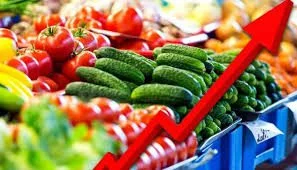 Nigeria’s inflation rate surged to new highs, significantly affecting the purchasing power of consumers and leading to concerns about economic stability across the country. According to the latest figures from the National Bureau of Statistics (NBS), the annual inflation rate reached 15.63% in December 2021, up from 15.40% the previous month. The NBS attributes the increase to rising food and transportation costs, with the most pronounced effects seen across essential commodities.
Nigeria’s inflation rate surged to new highs, significantly affecting the purchasing power of consumers and leading to concerns about economic stability across the country. According to the latest figures from the National Bureau of Statistics (NBS), the annual inflation rate reached 15.63% in December 2021, up from 15.40% the previous month. The NBS attributes the increase to rising food and transportation costs, with the most pronounced effects seen across essential commodities.
This latest spike marks the highest inflation level since April 2021, indicating a persistent challenge for Nigeria’s economy as it struggles with price increases and sluggish recovery from the COVID-19 pandemic. Food prices have seen some of the steepest rises, with staples such as rice, bread, and vegetables becoming increasingly unaffordable for many Nigerians. Food inflation specifically rose to 17.37% in December, a significant increase from previous months, driven by factors like disruptions in local food supply chains and high import costs.
In addition to rising food costs, transportation expenses have also contributed to the inflation spike. Fuel prices have steadily increased, impacted by global oil price fluctuations and currency exchange rate pressures. Many consumers have reported a visible increase in transportation fares, making daily commuting more costly. This combination of elevated food and transportation costs has put pressure on households across Nigeria, particularly for low-income families who spend a large portion of their income on basic needs.
The inflation increase has prompted responses from both economists and policymakers, who are concerned about the potential impacts on Nigeria’s broader economic recovery. Central Bank of Nigeria (CBN) Governor Godwin Emefiele announced that the bank is closely monitoring the situation and may consider adjusting monetary policies to address the issue. The CBN has already employed interest rate hikes in the past to counter inflation, but experts suggest that the current inflation drivers—mainly supply-side pressures and currency depreciation—may require more comprehensive solutions.
In response to the situation, some state governments have begun initiating subsidy programs and other relief efforts to support the most affected communities. However, these measures are seen as short-term solutions, with analysts calling for structural reforms to address the root causes of inflation. The Nigerian government has yet to announce a definitive strategy, but discussions are underway among key economic stakeholders to explore sustainable solutions.
For many Nigerians, the inflation surge has posed an immediate challenge in affording essential goods and services, raising concerns over food security and economic resilience. Analysts warn that if inflation remains high, it could potentially slow down the country’s economic growth and deepen poverty levels in the coming months.


















